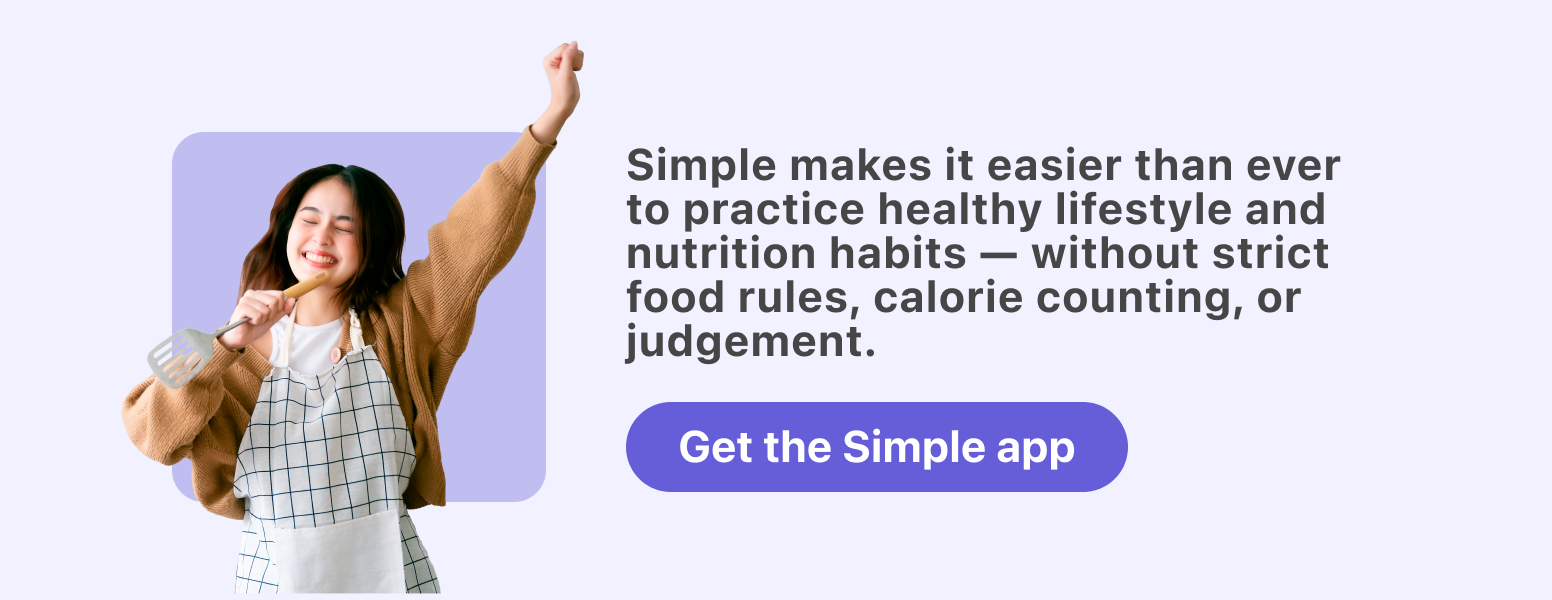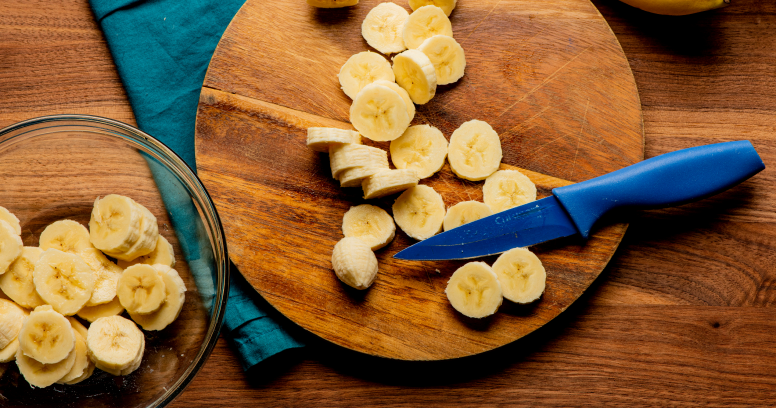Going bananas for health: The ultimate guide to this fruity powerhouse

After a hectic afternoon of meetings, you finally have time to breathe and grab a convenient, no-brainer snack. Do you reach for chips and cookies? Fair enough — they’re so convenient!
But there’s another option that won’t lead to a sugar crash: bananas. Grab and enjoy that healthy carb source that comes in its own package for a snack that’s healthy, satisfying, and fiber-rich — keeping your gut happy, too!

So, let’s talk about bananas, a convenient, nutrient-dense fruit that can curb your 4 PM hunger pangs, dress up your morning oatmeal, or sneak into muffins to boost nutrition and fiber.
Wondering how bananas fit into your overall diet and wellness routine? Dive into the Simple quiz to find out more. Let’s go bananas for health together!
Nutritional value of bananas
Slow-digesting carbohydrates for sustained energy
In the past, some health experts have given bananas a bad rap because of the carbohydrates they contain. But they were wrong. Despite bananas’ creamy-sweet taste, their carbohydrates digest relatively slowly, thanks to bananas’ fiber content.
And if you’re a green banana fan, those carbs will digest even more slowly, as less-ripe bananas contain much more starch than sugar.[1] (By the way, many bakers in tropical regions often use banana flour made from green bananas.)
That means bananas are a great carb source for anyone looking for an energy boost or just a healthy, sweet-tasting option.
One banana provides 27 g of carbs, a perfect amount as a snack during your eating window.
Pro tips:
- Try having a banana one hour before your workout to get that extra boost.
- Or, enjoy a banana after you exercise to help replenish lost glycogen (muscle fuel).
Resistant starch and fiber
Resistant starch is a special type of starch that — as its name suggests — resists digestive enzymes and doesn’t break down fully in our small intestine. So we don’t absorb all the calories it contains.
But the gut bacteria that live in our large intestine / colon love to munch on it. Green bananas, in particular, are high in resistant starch.
In general, bananas are a great source of fiber and resistant starch.
This helps improve your digestive health by feeding the good bacteria in your gut. These little critters, in turn, produce health-promoting short-chain fatty acids (SCFAs) like butyrate, which have many health benefits, including supporting gut health.[2]
Pro tips:
- A banana can help satisfy sweet cravings in a healthier way compared to processed foods like cakes and sweets.
- Ripeness matters — greener bananas are higher in starch but lower in sugars, while riper bananas are sweeter and have more natural sugars.

Vitamins and minerals
Has muscle pain got you down? Bananas are rich in potassium and magnesium, which help regulate your muscle and nerve contractions and fluid balance. Plus, it may help reduce your heart disease risk.
One normal-sized banana can give you 350 mg of potassium, or about one-quarter of your daily needs.[3]
Magnesium and B vitamins have been linked with regulating mood.[4] Bananas are high in vitamin B6, which may help promote brain health and reduce your risk for depression.[5,6]
Although the relationship is far more complex, there are links between these nutrients and cognition (aka helping your brain think really well), and bananas can be a useful way to increase your nutrient intake.
Bananas also have vitamin C, a powerful antioxidant that helps maintain proper immune function and tissue healing.[7]
Bananas also contain:
- phosphorus, part of building healthy bones[8]
- manganese, part of many antioxidant enzymes and our immune systems[9]
- copper, which is involved in many systems, including energy production and structures like connective tissues, blood vessels, and brain tissue[10]
Pro tip: The potassium in bananas can help with easing the tension in your blood vessel walls, lowering your blood pressure. That’s why potassium is an essential component of the heart-healthy DASH diet (Dietary Approaches to Stop Hypertension).
Want to know more about the nutritional punch of every meal? Whether you’re enjoying a banana or a banana bread, our Nutrition Scores give you an expert breakdown. And if you’re looking for more ways to incorporate bananas into your diet, our recipe section’s got your back. Start your journey with our Simple quiz and elevate your health game.
Potential risks and downsides

Allergies
Banana allergies affect less than 1% of the population. Interestingly, if you’re allergic to latex, you may be allergic to bananas since the proteins are similar. If you feel that you may be allergic to bananas, please consult with your healthcare provider for medical input.
Pro tip: Cooking often helps. If cooked bananas are safe for you, try cooking a banana with cinnamon for a delicious after-meal dessert.
Watch out for excess sugar
Speaking of desserts, remember that banana-based products like banana bread typically have lots of added sugar, fat, and salt.
This doesn’t make them “bad,” just something to consider as you eat a wide variety of foods — and a reminder to check ingredients!
Luckily, there are ways to make banana bread healthier by using whole wheat flour, adding oats or nuts for extra fiber and protein, and replacing some or all of the butter or oil with applesauce or yogurt.
Pro tip: You can make many baked goods (such as muffins) lower in calories — but still delectably moist — by substituting some of the sugar with mashed bananas for some extra sweetness and fiber.
Bananas and IBS
If you have irritable bowel syndrome, you may not tolerate bananas well.
Larger unripe bananas contain high amounts of FODMAPs (fermentable oligosaccharides, disaccharides, monosaccharides, and polyols).[11,12] These are types of carbohydrates that some people don’t digest well and which can trigger symptoms like bloating and gas.
According to Monash University’s FODMAP guidelines, you can handle one medium banana if you have IBS. For ripe bananas, you may only tolerate 1/3 of the fruit.[13]
These are just guidelines. If you do have IBS — it’s best you leave the support to your healthcare providers or specialist registered dietitians who can assist you further.
How to choose and store bananas
How to choose a banana
There are up to 300 cultivars, or varieties, of bananas in the world.
In North America and Europe, you’ll often see only the standard yellow Cavendish but look around for other varieties (such as red bananas or baby bananas) that have different tastes and textures.
The way you choose your bananas depends on how ripe you want them.
- Very ripe bananas are sweeter and are great for mashing and blending — for instance, try peeling very ripe bananas and then freezing them. Toss the frozen bananas in a blender for delicious “ice cream.”
- Green, less-ripe bananas are starchier. Many world cuisines use them like potatoes — for instance, as an ingredient in curries.
And then, there’s the banana’s humble cousin, the plantain. It has a similar nutritional profile, leaning more toward the starchy side.[14] They can also be used at any stage from green to yellow, but letting them turn black before cooking will yield the sweetest, easiest-peeling version.
How to store bananas
Have your bananas ever done a 180 while you’re snoozing? We’ve all seen it: one day they’re green, the next day they’re yellow with brown spots!
To avoid this, store your bananas at room temperature, uncovered in a bowl, or hanging position. Slow down the ripening of your bananas by separating them or wrapping the stalk in plastic wrap. The stalk releases ethylene gas, which accelerates the ripening. By protecting the stem, you reduce these ethylene emissions.
Once they’ve reached your preferred level of ripeness, pop them in the fridge. If you want to speed up the ripening process, place the entire bunch of bananas in a brown paper bag — the ethylene will speed up the ripening process.
Frequently asked questions about bananas
Bananas can be included in a diabetic diet when consumed in moderation and as part of a well-balanced meal plan. Their fiber content may help regulate blood sugar levels, but portion control is crucial — stick to one portion of fruit (one medium banana) in one sitting, and still aim for your four servings of fruit daily.
Navigating the vast world of nutrition can be tricky. From understanding the benefits of bananas to tracking your daily hydration, SIMPLE has you covered. Ready to blend health, knowledge, and technology? Start with the SIMPLE quiz now!

- Zhang P, Whistler RL, BeMiller JN, Hamaker BR. Banana starch: Production, physicochemical properties, and digestibility—a review. Carbohydr Polym. 2005 Mar 15;59(4):443–58.
- Leonel AJ, Alvarez-Leite JI. Butyrate: Implications for intestinal function. Curr Opin Clin Nutr Metab Care. 2012 Sep;15(5):474–9.
- Ranjha MMAN, Irfan S, Nadeem M, Mahmood S. A comprehensive review on nutritional value, medicinal uses, and processing of banana. Food Rev Int. 2022 Feb 17;38(2):199–225.
- Tarleton EK, Littenberg B. Magnesium intake and depression in adults. J Am Board Fam Med. 2015 Mar-Apr;28(2):249–56.
- Malouf R, Grimley Evans J. The effect of vitamin B6 on cognition. Cochrane Database Syst Rev. 2003;(4):CD004393.
- Merete C, Falcon LM, Tucker KL. Vitamin B6 is associated with depressive symptomatology in Massachusetts elders. J Am Coll Nutr. 2008 Jun;27(3):421–7.
- Carr AC, Maggini S. Vitamin C and Immune Function. Nutrients. 2017 Nov 3;9(11).
- National Institute of Health Dietary Supplement Fact Sheets: Phosphorus [Internet]. [cited 2023 Sep 7]. Available from: https://ods.od.nih.gov/factsheets/Phosphorus-Consumer/
- National Institute of Health Dietary Supplement Fact Sheets: Manganese [Internet]. [cited 2023 Sep 7]. Available from: https://ods.od.nih.gov/factsheets/Manganese-Consumer/
- National Institute of Health Dietary Supplement Fact Sheets: Copper [Internet]. [cited 2023 Sep 7]. Available from: https://ods.od.nih.gov/factsheets/Copper-Consumer/
- Bellini M, Tonarelli S, Nagy AG, Pancetti A, Costa F, Ricchiuti A, et al. Low FODMAP diet: Evidence, doubts, and hopes. Nutrients. 2020 Jan 4;12(1).
- van Lanen AS, de Bree A, Greyling A. Efficacy of a low-FODMAP diet in adult irritable bowel syndrome: A systematic review and meta-analysis. Eur J Nutr. 2021 Sep;60(6):3523.
- Low FODMAP Diet | IBS Research at Monash University – Monash Fodmap [Internet]. [cited 2023 Sep 7]. Available from: https://www.monashfodmap.com/
- Arora M, Rasane P, Singh J, Kaur S, Bakshi M, Kaur J. Reinventing plantain as a functional food: A processing based approach. Curr Nutr Food Sci. 2022;18(8):752–64.
